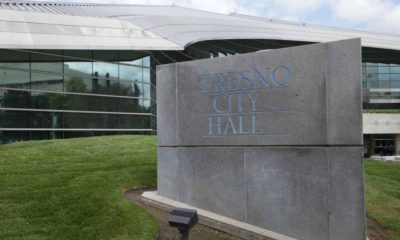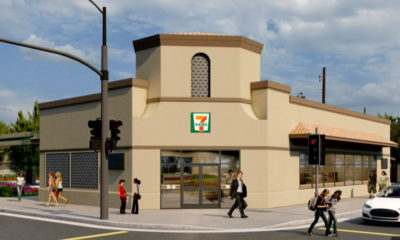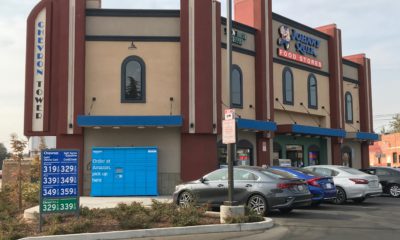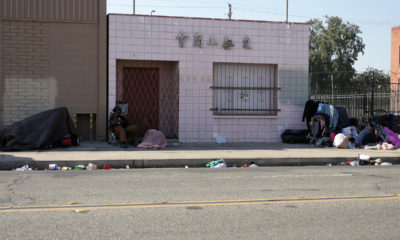Economy
City OKs Alcohol Sale Restrictions After Promising to Aid Grocery Stores
Published
5 years agoon

After a 2-hour discussion and public comment from residents from throughout Fresno, the Fresno City Council passed the Responsible Neighborhood Market Act on a 6-1 vote. Council Member Mike Karbassi was the only member to vote no.
Listen to this article:
“Thank you to the youth of our city and our residents and everybody who called in today,” council President Miguel Arias said after the final vote was tallied.
The act is the result of 22 months of study and meetings in an effort to reduce the number of beer, wine and liquor merchants in the city.
Karbassi and council member Garry Bredefeld expressed concern that the act would drive up the price of alcohol licenses to the point where small, neighborhood grocery stores, wishing to sell alcohol, wouldn’t be able to afford to open.
[rlic_related_post_one]Early in the meeting, the council adopted a plan to waive impact fees through 2022 for new grocery stores opening in underserved areas. In addition, Councilman Luis Chavez pledged to bring forward additional legislation aimed at creating incentives for markets that sell higher quality food products than typically offered by convenience stores.

“I’m always open to exploring and considering how we provide incentives to grocery stores.”–Fresno City Council president Miguel Arias
Responsible Neighborhood Market Act
Starting in 30 days, changes at the city level will include:
— Obtaining and retiring multiple ABC licenses in order to open a new store selling alcohol or to upgrade an existing market. The number of existing licenses that would need to be acquired by a new alcohol retailer would depend on the square footage of the proposed store.
— Increasing the distance between future alcohol retailers from 500 feet to 1,000 feet.
— Changing the distance future alcohol retailers must be from “sensitive” locations from 500 feet to 1,000. Sensitive locations include schools, parks and drug treatment centers.
— Limiting the display of signage and advertising in future stores.
— The stricter rules will remain as long as the ratio of retail alcohol licenses in the city exceeds one for every 2,500 residents. According to city staff, Fresno currently has double that number of licenses.

PowerPoint slide shown at Thursday’s City Council meeting illustrating the impact of new alcohol licensing rules. (City of Fresno)
Putting Bad Operators on Notice

“I also want to take this opportunity to put on notice those bad operators. I’ve been keeping a list in my district of about, you know, five or six of them. The city of Fresno is not going to tolerate that anymore.”–Fresno City Councilman Luis Chavez
“I also want to take this opportunity to put on notice those bad operators,” said Councilman Luis Chavez. “I’ve been keeping a list in my district of about, you know, five or six of them. The city of Fresno is not going to tolerate that anymore.”
Chavez says he wants to hold current liquor retailers accountable.
“We’re also going to include a enforcement component of this,” said Chavez. “This will be an opportunity for those operators to clean up their act or they will not be allowed to sell these types of products in our city.”
Public Comments
Southwest Fresno resident Debbie Darden spoke first, and used a movie reference to drive her point home. “For those of you who have seen the movie Boyz in the Hood, Laurence Fishburne stated it best when he said he asked a question, ‘Why do you think they put liquor stores in communities like West Fresno on every corner? It is so that we can kill ourselves.”
Rod Wade Jr. of ‘Fresno United’, an organization working to curb gang violence, said “Among California’s largest cities, Fresno has the highest concentration of alcohol licenses. Oversaturation is detrimental to the quality of life of neighborhoods.”
Delano Hopkins, who said he’s lived in southwest Fresno for 20 years, said repeatedly, “We don’t need no more liquor stores in southwest Fresno.
“I don’t know if you guys are paying attention or listening. You know, we don’t need no more liquor stores in southwest Fresno.”
Hopkins drew applause from the audience in the council chamber when he said he’s seen dog parks in other parts of the city, but no good parks for kids to play in where he lives.
John Kinsey of the law firm Wanger Jones Helsley PC said it’s important the city go after the bad liquor stores in Fresno, but worried the new measure would have unintended consequences. “We’re concerned that this text amendment will ultimately concentrate licenses with existing users and existing areas, and we want to work with the city to help prevent that,” Kinsey told the council by phone. (Kinsey represents Granville homes. Darius Assemi is the President/CEO, and also the publisher of GVWire.)

Councilmen Miguel Arias and Garry Bredefeld talk on the dais before voting on the Responsible Neighborhood Market Act. (GV Wire/Jahz Tello)
Kristin Safian called in to express her concerns about alcohol in general. “The issue of alcohol has been huge in my family, so I know firsthand how devastating having this drug around can be and proliferation. My uncle has passed away at the age of 48 due to alcoholism and my father has been in and out of rehab facilities,” said Safian.
Kaya Herron, Director of Community Engagement and Advocacy for the Fresno Metro Black Chamber of Commerce was concerned the act would hinder new grocery stores from opening. “Current license holders will potentially be given an unfair advantage and will be able to set the price for license purchases necessary to satisfy the ordinance requirements,” said Herron.
The Fresno Metro Black Chamber of Commerce sent a letter to the council asking for a delay in voting on the new rules so that concerns could be addressed.
Bredefeld & Karbassi Concerns

“I have some concerns about the grocery stores we want to come into neighborhoods.”–Fresno City Councilman Garry Bredefeld
“I have some concerns about the grocery stores we want to come into neighborhoods,” said Bredefeld.
Chavez said a committee would be formed to define what a grocery store is. He said he wants stores like Aldi’s or Trader Joe’s, “that include fresh fruits, vegetables, dairy products, baked goods, deli meat, and a little mini meat area,” explained Chavez.
Chavez said if a grocery store wants to open in a a neighborhood, the operators would be required to first meet with the council member in the district. Second, they’d meet with the implementation committee consisting of residents that actually live in the area, and third come back to council for consideration. “I really intend to make sure that the residents have a huge say in what actually goes into their neighborhoods,” said Chavez.
Bredefeld said the committee should focus on ways to maximize incentives to encourage new grocery stores. He suggested city tax and fee credits of 50% of the value of additional alcohol licenses store would be required to obtain as a way to help attract businesses to areas like southwest and southeast Fresno.
Arias offered qualified support to Bredefeld’s suggestion. “I’m always open to exploring and considering how we provide incentives to grocery stores,” Arias said. “So to your proposal, I’m open to it. As long as it’s not given to the 7-11, the Chevron or the liquor store that might rebrand itself as a grocery store.”
Karbassi tried getting an answer to his question about incentives. “What is the dollar value of the fee that’s being waived to incentivize these markets going in?”
Arias responded by saying, “I think it’s a fair question and I think we can fully vet that question when the council member (Chavez) brings his proposal forward.”
You may like
-


New Fresno Council to Hear PLA, Measure P, Right to Counsel
-


Valley Lawmaker Seeks Medi-Cal for More Undocumented Residents in First Week Bill Flurry
-


Policing Changes Coming to Fresno. Implementation is Next Step.
-


Even Without Alcohol Sales, Proposed Neighborhood Store Faced Council Hurdles
-


Amazon Lock Boxes are a ‘Blight to the Area,’ Says Councilmember
-


‘Corruption’ or ‘Pure Politics’? What’s Behind Heated Charges Over City Trash Contract.













